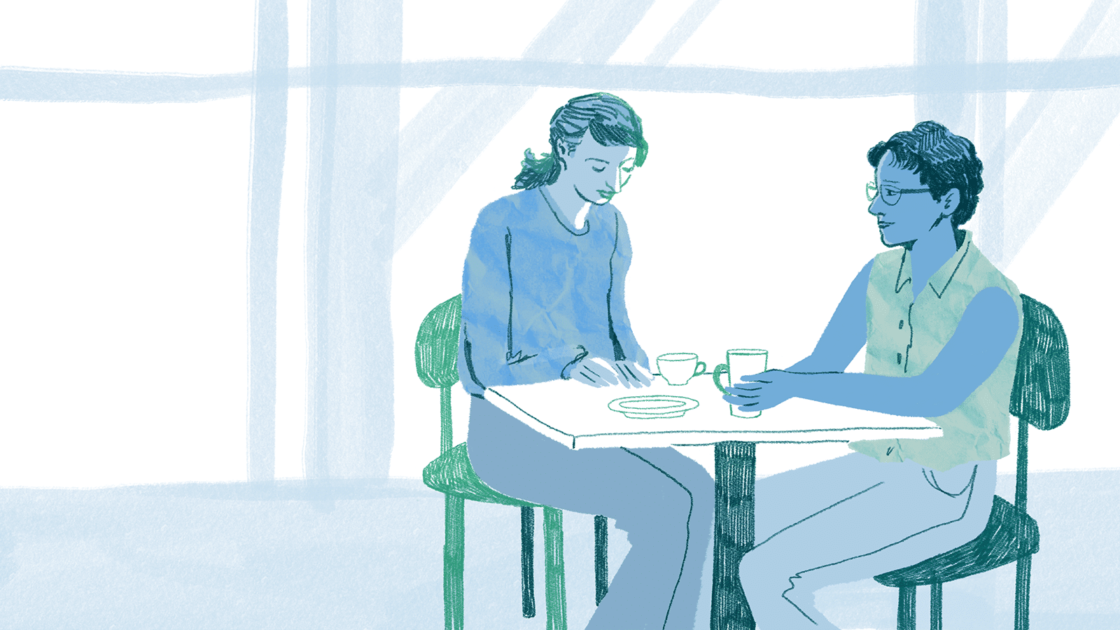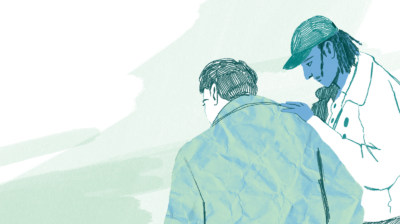How to find support if you have lost someone to suicide
Losing someone to a death by suicide can have a significant impact on your life and your wellbeing, but there are supports available.

If someone in your life dies by suicide, it can affect you in many different ways. It can take a toll on your physical and mental health, put a strain on your relationships, and make it difficult to complete daily activities. Suicide can be sudden and unexpected, which can lead to shock, confusion and unanswered questions. Grieving the loss of a loved one to suicide can be a difficult and painful process that takes time. No two grief journeys are the same, but no matter how you are affected by a suicide loss, there are supports available that can help you on this journey.
How do I know if I need extra support following a suicide loss?
If your life has been touched by suicide in any way, you deserve care and support to help you process what you’re going through. Sometimes, people feel like they shouldn’t be accessing support because they think other people deserve it more or because they believe they weren’t ‘close enough’ to the person they lost. Stigma can also make it more difficult to reach out for support. In reality, losing anyone in your life to suicide can have a significant impact on you. They don’t have to be a close friend or family member.
Suicide grief doesn’t follow a set timeline, and it’s never too late to ask for help. No matter how long it has been since you lost someone, you can still reach out for support.
Many people manage their grief on their own with the support of friends and family, but reaching out for professional help can also be beneficial. Here are some signs that you might benefit from external help:
- Your usual coping mechanisms aren’t helping or are increasing your distress
- You’re experiencing low mood or anxiety that isn’t going away or easing
- You’re finding it difficult to complete daily tasks
- You’re feeling overwhelmed or finding it difficult to cope
- You’re having nightmares or flashbacks
- You’re finding it difficult to eat or sleep
- You have become isolated
- You are self-harming
- You’re having suicidal thoughts
If you think you would benefit from some extra support, there are a range of options available that you may find helpful. You can reach out to these supports at any time.
What are my support options following a suicide loss?
Every person is unique and we each tend to have different emotional (i.e., how we feel), behavioural (i.e., how we act or behave) and psychological (i.e., how we think) responses to grief. Some people like to talk to others about what has happened while others might prefer to focus on actions. Whatever way you cope, it is really important to have good support. There are a range of professionals, groups and organisations available to help in different ways, and you can choose to access the type of support that best meets your needs and feels right for you. Whoever you choose to reach out to for help should ideally accept how you are feeling and recognise the challenges that you are facing. Supports include helplines, therapy, support groups, peer support and other resources.
Peer support groups for suicide bereavement
Sometimes, people find that talking to other people who have also experienced suicide bereavement brings them comfort and healing. No two grief journeys are exactly the same, but they often have some things in common. Talking to people you can relate to in peer support groups can be really helpful when you’ve lost someone to suicide.
HUGG
HUGG provides peer support groups to anyone over 18 years who has lost a loved one to suicide. All of their support groups are provided by people who have been bereaved by suicide and you can access them online or in-person. You can also find resources and signposting to services throughout the country on their website, hugg.ie.
Helplines for suicide bereavement
Helplines can be helpful tools for coping with grief following a suicide. Many people choose to use helplines because they are often available 24/7, they can be accessed immediately, and they find it easier to talk to someone anonymously through phone or text instead of face to face. Here are some helplines that can support you after losing someone to suicide.
Text About It
Text About It is a free, anonymous, 24/7 messaging service providing everything from a calming chat to immediate support. This service provides a safe space where you’re listened to by a trained Volunteer. Free-text SPUNOUT to 50808 to begin
Irish Hospice Foundation Bereavement Support Line
The Irish Hospice Foundation provide a confidential space for people to speak about their experience or to ask questions relating to the death of someone they cared about.
The line is available to anyone aged 18 or over between 10am and 1pm, Monday-Friday. Freephone 1800 80 70 77 to speak to someone during those hours.
Pieta
If you have been bereaved by suicide, you can use Pieta’s 24/7 phone line and text messaging service. Their helpline team are professionally trained therapists who are there to listen to you. To access their service, call 1800 247 247 or text HELP to 51444. Keep in mind that standard message rates apply when using their text service.
Childline
Childline offers free, 24/7 phone and instant messaging support for young people up to and including the age of 18. These services allow you to talk with a counsellor about anything and receive support or help with whatever is worrying you at the moment. Whatever is said on the instant messaging service is confidential, so it will stay between you and Childline. Call 1800 66 66 66 to begin.
Counselling and therapy for suicide bereavement
Losing someone to suicide can cause trauma, and mental and emotional distress, and can sometimes lead to mental health issues. Counselling and psychotherapy can be powerful tools for easing the impact of grief. Here are some organisations that provide therapy to people who have been bereaved by suicide.
Barnardos Bereavement Service
Barnardos deliver a specialist bereavement service where people up to age 18 and their families are supported to grieve. The service offers a blend of parent-child, individual and family sessions. You need to be referred to the service by a parent or carer. They can contact Barnardos by calling them directly through their helpline 01 473 2110 or by contacting their service in Cork or Dublin.
Pieta bereavement counselling
Pieta provides free counselling to young people who have been bereaved by suicide. Their counselling service provides person-centred, flexible bereavement support which meets the needs of their clients. You can access their counselling service once 8 weeks have passed since your loss. Pieta provides a different support service, called the Suicide Bereavement Liaison Service if you need help within the first 8 weeks post-bereavement. You can read more about that below. If you are over 18, you can set up an appointment yourself by calling their helpline at 1800 247 247. If you are under 18, you will need a parent or guardian to set up the appointment for you.
Private counselling or psychotherapy for suicide grief
Some people choose to access private counselling or psychotherapy to help manage their grief. If you are considering exploring this route to support, our article on how to access private counselling or psychotherapy in Ireland can help.
Suicide Bereavement Liaison Service
The Suicide Bereavement Liaison Service is a free, confidential service that provides assistance and support to families and individuals after the loss of a loved one to suicide. The Suicide Bereavement Liaison Officer can meet with a bereaved family (at their request) as a group or individually. The service can answer questions about some of the difficult practical issues following a death by suicide. You may want guidance or assistance in accessing therapy, or even just to talk with someone locally, about what has happened. This service is provided by different agencies throughout Ireland:
- pieta.ie
- vitahouse.org (Roscommon)
- thefamilycentre.com (Mayo)
What if I am experiencing suicidal thoughts?
When someone experiences the trauma of losing someone to suicide, it can cause them to experience their own suicidal thoughts. If you are feeling overwhelmed and having thoughts of suicide, there are things you can do to manage and overcome these thoughts. There is help and support available, you don’t have to deal with suicidal thoughts on your own. Some people find it helpful to talk to someone they trust about what they’re experiencing. If you would prefer not to talk to friends or family, there are a range of support services across Ireland that help people who are thinking of suicide. The pain of losing someone can sometimes be so intense that you feel like you can’t survive, but know that you can survive, and the right support can make a big difference.
Feeling overwhelmed and want to talk to someone?
- Get anonymous support 24/7 with our text message support service
- Connect with a trained volunteer who will listen to you, and help you to move forward feeling better
- Whatsapp us now or free-text SPUNOUT to 50808 to begin.
- Find out more about our text message support service
If you are a customer of the 48 or An Post network or cannot get through using the ‘50808’ short code please text HELLO to 086 1800 280 (standard message rates may apply). Some smaller networks do not support short codes like ‘50808’.






